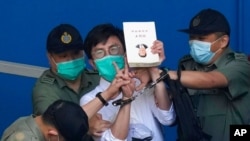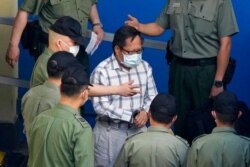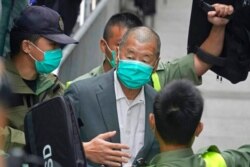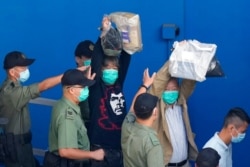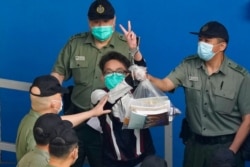Several of Hong Kong's pro-democracy activists were again under the strain of the city's judicial system on Friday, after a court sentenced eight to prison for their role in protests two years ago.
Ten pro-democracy activists, including Jimmy Lai, Lee Cheuk-Yan and Avery Ng, pleaded guilty last week for their involvement in organizing an unauthorized assembly on October 1, 2019. The street protests in Hong Kong — which took place while China's central government celebrated its 70th anniversary — attracted thousands and turned violent, with a teenage protester shot by police. Hundreds more were arrested.
Wan Chai District Court Judge Amanda Woodcock sentenced eight of the group — Avery Ng, Figo Chan, Cyd Ho, Albert Ho, Yeung Sum, Jimmy Lai, Lee Cheuk Yan and Leung Kwok-hung — to jail terms ranging from 14 to 18 months. The remaining two, Sin Chung and Richard Tsoi, were given suspended sentences. Six of the 10 had been remanded to custody since May 18 following their guilty pleas and had bail applications rejected.
The remaining four defendants, Lai, Lee, Leung and Cyd Ho, were already serving jail time because of other offenses, with Lai and Leung also facing charges under the national security law. Some of the new sentences for those already serving prison terms will be served concurrently.
Under the "one country, two systems" agreement signed by Britain and China in 1997 after the city was transferred back to Chinese rule, Beijing promised that Hong Kong would retain a "high degree of autonomy" until 2047.
After the 2019 anti-government protests, Beijing implemented the national security law in June of last year in an attempt to bring stability back to Hong Kong. Since the law became active, a host of changes have occurred, including dozens of pro-democracy activists and political figures being arrested and jailed.
During the trial, several of the defendants' lawyers argued that the activists had encouraged peaceful protests on China's National Day. But according to local reports, Woodcock said it was "naïve and unrealistic" for the activists to not believe violence would unfold during the march.
Former Democratic Party member of the Legislative Council Emily Lau spoke to VOA via phone while inside the court building after the sentencing was announced.
"I feel very, very distressed because many of these people, they have devoted [a] long, long time to the fight for human rights, rule of law and democracy in Hong Kong. And some are former legislators and it's very sad to see they have been given such long jail sentences for taking part in an unauthorized assembly.
"And they never have encouraged violence, although of course there were incidents of violence on that day, so it is a chilling message sent out to the community, and it's a very, very sad day for Hong Kong."
Ted Hui, a former pro-democracy Hong Kong lawmaker, is now self-exiled in Australia, facing charges within the city. Hui echoed Lau's comments, telling VOA in a phone message, "I feel that the court is influenced by the harsher and harsher attitude of the regime towards dissents under the national security law. In the past, the starting point of sentence in similar cases was usually fines or suspended sentence."
But Lau admitted there are those within Hong Kong who wish these sentences were much more severe.
"Hong Kong is a very, very split society and there are others who are clamoring for longer sentences, so it's a very sad place," she said. "I think the fight for freedom, for rule of law, for democracy should and will go on, but I stress it must be conducted in a peaceful and non-violent way."
Pro-Beijing lawmaker and Legislative Council member Holden Chow welcomed the court's decision.
"We recall all the chaos done in 2019 and the dire consequences of the protesters breaking the law. Sentencing must be tough enough to cause a deterring effect, which is important to maintaining law and order. These activists are responsible for the chaos in 2019 because they simply encourage people to embrace violence and make excuses for the riots," Chow told VOA.
"Proper imprisonment and sentencing are of crucial importance to the stability of Hong Kong," he added.
Before being remanded into custody, jailed League of Social Democrats General Secretary Avery Ng outlined the difficulties in challenging the government's decisions.
"In the current climate anyone who organizes protests potentially faces years in prison. That puts us in a difficult situation, and that's nothing new," he told VOA.
The sentencing follows news that Hong Kong's annual vigil to commemorate those killed during the Tiananmen Square protests in Beijing in 1989 was recently rejected by authorities, citing the COVID-19 pandemic. The yearly event was denied approval last year for the first time in 31 years for the same reason, according to the South China Morning Post.
"I think on all fronts the authorities are trying to send out a signal to people not to breach anything that is banned by the police. But of course, people are used to peaceful assembly in Hong Kong and it is very, very distressing that now it seems that's no longer tolerated," Lau said.




